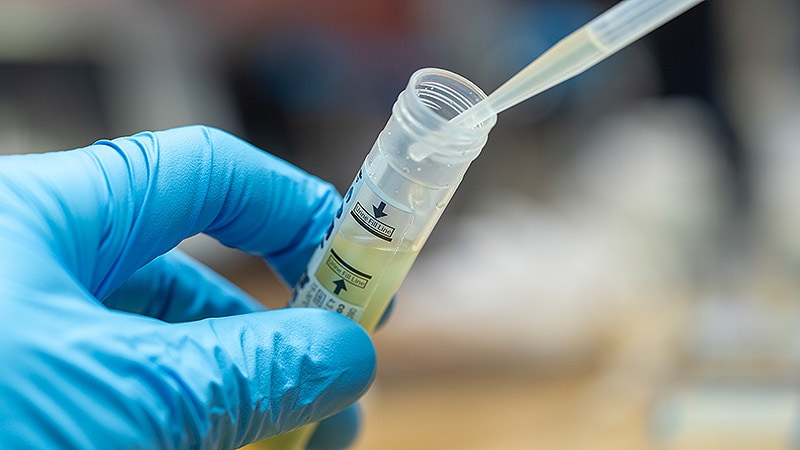Urine Tests: A Promising Frontier in Early Cancer Detection and Monitoring
核心概念
Urine tests could provide a convenient, pain-free, and cost-effective way to detect and monitor various cancers, offering an "enormous step" in reducing cancer mortality.
要約
The article discusses the emerging potential of urine tests for cancer detection and monitoring. It highlights several promising examples of urine-based cancer biomarkers under investigation:
-
Prostate cancer: The MyProstateScore 2.0 (MPS2) test detects high-grade prostate cancer more accurately than existing tests by looking for 18 genes associated with high-grade tumors. It could reduce unnecessary biopsies by 35-45%.
-
Head and neck cancer: A test that finds ultra-short fragments of DNA in urine can enable early detection of head and neck cancers caused by human papillomavirus. It can detect cancer from just 5-10 tumor cells.
-
Pancreatic cancer: A urine panel measuring expression levels of three genes (LYVE1, REG1B, and TFF1) combined with urinary creatinine and patient age can predict the risk of pancreatic cancer up to 2 years before diagnosis.
The article notes that while more research is needed to map out which substances in urine predict which cancers, urine testing could be especially impactful for patients with limited access to healthcare services. Collaborations between scientists and clinicians using artificial intelligence techniques to integrate urine test results with other data could help overcome the medical and technological hurdles to large-scale implementation.
Urine Tests Could Be 'Enormous Step' in Diagnosing Cancer
統計
The MPS2 test could eliminate 35%-45% of unnecessary biopsies, compared with 15%-30% for other existing tests, and reduce repeat biopsies by 46%-51%, compared with 9%-21% for the other tests.
The head and neck cancer test can detect cancer from just 5-10 tumor cells.
The pancreatic cancer urine panel can predict the risk of pancreatic cancer up to 2 years before diagnosis.
引用
"The search for cancer biomarkers that can be detected in urine could provide an enormous step forward to decrease cancer patient mortality."
"It is highly promising to be one of the major biological fluids used for screening, diagnosis, prognosis, and monitoring treatment efficiency in the era of precision medicine."
"When we are instead detecting fragments of DNA released from a tumor, our testing methods are very sensitive and can detect DNA in urine that came from just 5-10 cells in a tumor that died and released their DNA into the blood, which then made its way into the urine."
深掘り質問
What are the potential limitations and challenges in implementing urine-based cancer tests on a large scale?
Implementing urine-based cancer tests on a large scale faces several limitations and challenges. Firstly, cancer biomarkers in urine must be able to pass through the renal nephrons, remain stable in urine, and have high sensitivity and specificity for cancer. Additionally, these biomarkers should be expressed at early stages of cancer before the primary tumor has spread. Currently, few circulating biomarkers have been found that meet these criteria, making it challenging to develop reliable urine-based tests for cancer detection. Moreover, there are medical and technological hurdles to the large-scale implementation of urine analysis for complex diseases like cancer. Further research is needed to identify which substances in urine predict specific cancers and to develop tests that can be widely adopted.
How could the integration of urine test results with other patient data, such as genetic, proteomic, and behavioral information, improve the accuracy and clinical utility of these tests?
Integrating urine test results with other patient data, such as genetic, proteomic, and behavioral information, could significantly enhance the accuracy and clinical utility of these tests. By combining urine analysis with comprehensive patient data, including genetic profiles, protein markers, and behavioral factors, healthcare providers can obtain a more holistic view of an individual's health status. This integrated approach could help in identifying specific biomarkers in urine that are indicative of various cancers or health conditions. Furthermore, leveraging artificial intelligence techniques to analyze this combined data could lead to more precise and personalized diagnostics, enabling early detection and targeted treatment strategies. Overall, the integration of urine test results with other patient data holds great potential in improving the effectiveness of cancer detection and monitoring.
What other types of cancers or health conditions could potentially be detected or monitored through urine-based testing, and what are the areas of future research in this field?
Apart from the cancers mentioned in the context, such as prostate, head and neck, and pancreatic cancer, urine-based testing holds promise for detecting or monitoring various other types of cancers and health conditions. For instance, bladder cancer, kidney cancer, and urinary tract cancers could potentially be identified through urine analysis due to the proximity of these cancers to the urinary system. Moreover, conditions like urinary tract infections, kidney diseases, and metabolic disorders may also be monitored through urine-based testing. Future research in this field could focus on expanding the repertoire of cancer biomarkers detectable in urine, developing more sensitive and specific tests for different types of cancers, and exploring the integration of urine analysis with other biological samples like feces and saliva for a more comprehensive health assessment. Additionally, advancements in data science and machine learning techniques could further enhance the diagnostic capabilities of urine-based testing, paving the way for more accurate and efficient disease detection and monitoring strategies.

